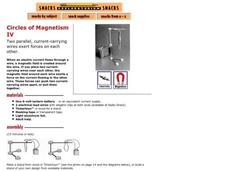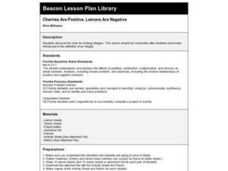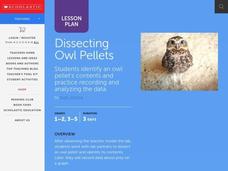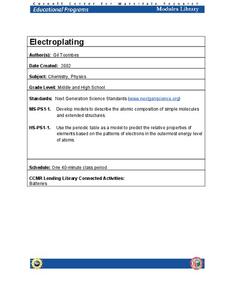Exploratorium
Circles of Magnetism IV
Hang a strip of foil on a stand and form a loop out of it. Then attach the clips of a battery-operated circuit to the loop to see its sides repel each other. This simple demonstration is applicable and easy to add to your lecture on...
Colorado State University
What Is a "Convection Cell"?
Round and round in circles it goes! A hands-on activity has learners recreate a model of a convection cell. They watch as the difference in density of their materials creates a current.
Curated OER
Baking Ice Cream
In this science and cooking worksheet, students investigate how it is possible to make a baked ice cream dessert. Students follow the detailed recipe, then answer the questions where they hypothesize why the ice cream did not melt.
Beacon Learning Center
Cherries Are Positive, Lemons Are Negative
Lemon heads and cherry drops combine for a sweet lesson on positive and negative integers. Following an activity sheet, they use lemon as negative and cherry as positive and follow directions with a partner. An assessment, a rubric, and...
Exploratorium
Eddy Currents
Make electromagnetic eddy currents evident with this demonstration. You will need to gather a few materials from the local hardware store and a strong neodymium magnet, but the visual value is well worthwhile.
Discovery Education
Cool It!
Adjust the melting time of ice without varying the temperature! Learners experiment with different materials to decide how the materials affect the rate an ice cube melts. They then connect their findings to the conductivity of each...
Curated OER
More on Conduction and Convection
Why do some items feel colder when they are the same temperature? How should you keep your soda cold? What makes the wind blow? These are just some of the things middle schoolers discover when completing a lesson on...
Calvin Crest Outdoor School
Survival
Equip young campers with important survival knowledge with a set of engaging lessons. Teammates work together to complete three outdoor activities, which include building a shelter, starting a campfire, and finding directions in the...
PBS
Cloud Clues
It's cloudy with a good chance of learning! An inquiry-based lesson begins with an exploration of transparent, translucent, and opaque materials. Young scientists then connect their learning to the different cloud types as they take the...
Curated OER
WS 4.4 Stoichiometry Part 2
Four balanced chemical equations are presented for your pupils to analyze. They identify limiting reagents and use dimensional analysis to compute products. This practical worksheet is one that you will want to keep in your repertoire to...
Science Geek
Reaction Types
This is one way to get a reaction from your classes! The lesson presents the different reaction types with an explanation, chemical equation model, and examples. The slides include decomposition, single replacement, double replacement,...
Beyond Benign
The Big Melt: Arctic Ice Caps
Are the Arctic ice caps really melting out of existence? Junior climatologists examine the statistics of ice decline through four math-based lessons. Each activity incorporates data, climate information, and environmental impact into an...
DiscoverE
Hidden Alarm
It's time to wake up! Young engineers build an electric circuit that will activate an alarm. The use of switches in the circuit is a must—because you don't want the alarm to keep beeping forever!
American Museum of Natural History
The Amazing Mundo
Rocks and minerals are great on their own, but they also turn into some pretty amazing stuff! An online lesson explains the different types of materials we get from rocks and minerals, including glass, plastic, and coins. An embedded...
K12 Reader
Charge It!
Electrify your pupils' interest in conductors and insulators with a brief reading passage! After reading the text, learners respond to five questions that relate to the content of the passage.
Curated OER
Dissecting Owl Pellets
Students watch the teacher model the dissection then in pairs, they dissect an owl pellet and identify its contents. They record the data about its prey on a graph.
Curated OER
Sink or Float?
Have your class explore density and buoyancy using this resource. Learners read the book Who Sank the Boat, and use several items, such as rubber balls, bottle caps, wood, and other household items to conduct an experiment. Using a tub...
Curated OER
Less vs. Fewer
When should you use less, and when should you use fewer? Straighten out this dilemma with a helpful resource about using less vs. fewer based on sentence context clues. After reading detailed instructions and examples, young learners...
Normal Community High School
Classification of Matter
Steel is an example of homogeneous mixture, also called an alloy, which is made of iron and carbon. The presentation introduces learners to elements, compounds, and mixtures. They explore their similarities and differences, and then take...
PBS
Star Power
Let there be light—or maybe not. Pupils learn about light pollution with an investigation of constellations. They create constellation boxes and experiment with different levels of light. Observations are then made about the lighting in...
Curated OER
Modern Figure Sculpture
Alberto Giacometti is a renowned sculpture, made popular by his "tall, gaunt" figures. His sculptures have been interpreted in many ways: representing isolation, Holocaust victims, or of one standing against adversity. Giacometti says...
Big Kid Science
Create a Milk Carton Camera to Observe the Eclipse!
Step aside, fancy glasses... it's time to create a solar eclipse viewing camera of your own using nothing more than a milk carton.
Cornell University
Electroplating
Silver pennies and copper nickels are made possible by applying some chemistry. Learners use electrolysis to coat a penny with zinc sulfate and a nickel with copper sulfate. Their investigation builds an understanding of electroplating...
Cornell University
Light Waves: Grades 6-8
Explore the behavior of light with different materials. Collaborative groups determine whether certain materials absorb, reflect, diffract, or transmit light waves. They then measure the angle of incidence and angle of reflection.























